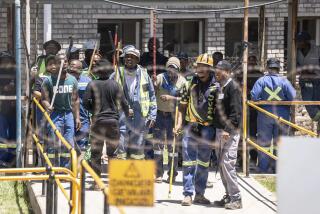Soviet Party, Mine Officials Join Coal Strikes in Siberia
- Share via
MOSCOW — Local Communist Party officials and mine executives have joined strikes in the Kuzbass coal region of western Siberia to protest centralized control over the industry, Soviet newspapers reported Saturday.
Officials from the Mining Ministry and regional party committees appealed to miners in at least nine cities to return to work, according to dispatches from Kuzbass, one of the country’s most important coal producing regions.
Newspapers described a chaotic situation in Kuzbass, which is about 2,560 miles east of Moscow.
The situation has developed into a battle by miners and mine executives to wrest control from the Moscow-based ministry, the newspaper Soviet Russia said. The miners want authority to set production levels and improve working conditions, housing, schools and food, it said.
“Strike committees have formed in the mines,” the paper reported. “Most of the people in authority have joined them. That includes many Communists, trade union representatives and party secretaries.”
Tens of thousands of miners met Saturday night with Coal Industry Minister Mikhail I. Shchadov in Prokopevsk, about 1,600 miles east of Moscow, according to the official Tass news agency and a local mine official.
“The minister is promising help,” said Yevgeny G. Koslov, an assistant mine surveyor in Prokopevsk. “They are having a dialogue.”
The Communist Party newspaper Socialist Industry identified two mining executives who joined the strikes as Mikhail I. Naidov, head of a group of mines in Prokopevsk, and I.A. Khamin, director of the Baidayevsky mine in a town not identified.
“Independence is just not possible,” Naidov said, because Moscow-based ministries make up to 90% of the economic decisions affecting local enterprises and governments.
“They say, ‘You just mine the coal, and we will guarantee the rest,’ ” Socialist Industry quoted Naidov as saying.
“But people do not have what they were guaranteed. People have nothing worthwhile, no housing, no food, no leisure facilities,” said Naidov.
“This is intolerable. It is not the mine but the individual who should be the master. The essence of the protest is this: We want to work more effectively,” he was quoted as saying.
Strikes have been spreading throughout Kuzbass, despite settlements reported with miners in two cities, Osiniki and Mezhdurechensk, where the strikes began Monday.
Authorities had reported an end to the strikes Thursday, but miners then expanded their agenda from economic issues such as food, housing and health care to broader demands for political change.
The government newspaper Izvestia, however, said the strikes spread because no one explained to residents of the region that the settlement in Mezhdurechensk applied to the entire area.
On Saturday, thousands of miners and their families held rallies in towns throughout the region, newspapers reported.
The crisis was the worst in Prokopevsk, where production was virtually halted, Socialist Industry reported.
“Events in the Kuzbass have taken a sharp turn,” the newspaper said. Although miners returned to work in Mezhdurechensk, in other mining towns in the area “the situation has sharply intensified.”
Published reports said miners were striking in nine cities in all.
More to Read
Sign up for Essential California
The most important California stories and recommendations in your inbox every morning.
You may occasionally receive promotional content from the Los Angeles Times.













